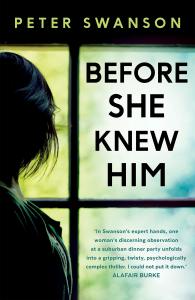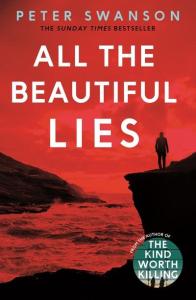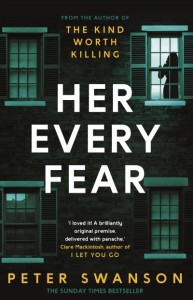Before She Knew Him – Peter Swanson
 There are various breeds of criminals in fiction and, sadly, in real life, from the crime lords who can only be vanquished by super-hero opposition, to everyday villains, driven by circumstances and opportunity, the stuff of domestic noirs and police procedurals.
There are various breeds of criminals in fiction and, sadly, in real life, from the crime lords who can only be vanquished by super-hero opposition, to everyday villains, driven by circumstances and opportunity, the stuff of domestic noirs and police procedurals.
And there is another breed, one that is disturbing, secretive and unfathomable. Men and women capable of hideous acts who at the same time manage to live a life that’s ordinary to the point of dullness. Who thrive on harnessing their dark nature, the evil conjoined twin of their other, seemingly innocuous one. The Dr Jekylls and Mr Hydes of crime.
Few contemporary writers are as devilishly cunning in telling their tales as Peter Swanson, the US author of ‘Before She Knew Him’. It is the fourth novel of his I’ve had the pleasure of reading and reviewing, after ‘The Kind Worth Killing’, ‘Her Every Fear’ and ‘All The Beautiful Lies’, and the fifth he published since 2014, when his debut novel ‘The Girl With a Clock for a Heart’ was nominated for the LA Times book award.
Swanson writes stand-alone stories, almost an oddity in contemporary crime and thriller literature, where series abound. Yet his novels stand in a class of their own, and ‘Before She Knew Him’ is no exception: a superb psychological suspense novel, slowly but irresistibly growing in tension, brilliantly observed in the nuances of its characterisation, and merciless in catching the reader entirely unaware with its twists.
‘Before She Knew Him’ opens with a glimpse of very normal suburban social life: a middle-class area on the outskirts of Boston, a late summer barbecue, new neighbours getting to know one another. Then the scene shifts to a cosy dinner party in which two couples in their mid-thirties, living next door to each other, start the beginning of an acquaintance. Mira is an educational software salesperson, and her husband Matthew is a history teacher at a local high school. Henrietta, known as Hen, is an artist specialising in prints and book illustration, and her husband Lloyd is a creative at a Boston ad agency.
All so harmlessly predictable on the surface, but as Swanson gradually unpeels the two couples’ veneer of ordinariness, disquieting elements begin to emerge. Hen has a history of bipolar syndrome and depression, which she’s now controlling through medication, but which in the past led to manic bouts, and to Hen accusing a fellow college student of plotting to kill her. Matthew instead had a hideously tough childhood, his father a violently exploitative man who physically and psychologically abused his wife, leaving an ineradicable mark on Matthew’s and his younger brother Richard’s psyche.
As Mira and Matthew show their two guests around the house after dinner, Hen sees a fencing trophy in Matthew’s study. A seemingly innocent item, yet she has grounds to believe it might belong to a young man, Dustin Miller, who was murdered a couple of years before, and whose killer was never brought to justice. Dustin was an unsavoury character, who as a teenager was accused of raping a girl who went to school with him, both away with the school’s team at a fencing tournament. Hen and Lloyd lived on the same street as Justin at the time of his death, and she followed the case with an intensity that made Lloyd fear she was relapsing into mental health problems.
After seeing the fencing trophy, Hen is convinced that Matthew, who happens to teach at the same school Dustin went to, could be the killer. A conviction which grows after Hen revisits the house and discovers the fencing trophy is missing – Matthew removed it the day after the dinner party, having realised that Hen had been spooked by it. Hen reports Matthew and the fencing trophy’s disappearance to the police, but they, and Lloyd too, are inclined to think she’s just a mentally unstable woman on a witch hunt.
Swanson is in his element charting Hen’s state of mind, her distress and her conviction that she is right, and yet may not be believed because of her history. As he is with plotting Matthew’s compulsively guarded behaviour, his weird relationship with his brother, who can’t stand the sight of Mira, and his hiding of the fencing trophy – among other things.
Swanson gradually reveals the secrets hidden within Hen’s and Matthew’s minds, taking the readers on a labyrinthine path through a twin maze with his customary spare, sharp prose. The plot alternates between Hen and Matthew, with Mira and Lloyd as interesting foils, and the readers are irresistibly enmeshed in a spider web of half-truths and deceit, of actions which are purportedly innocent and yet conceal a sinister purpose, and which culminate with a fresh murder, which Hen herself witnesses.
As I write this, I realise it is impossible to say anything more about the plot without spoiling the readers’ fun. Each event in ‘Before She Knew Him’, however trivial, is crucial to the plot, each as minutely observed as it is significant. And Swanson, unlike most other authors, isn’t shy in letting certain facts emerge early on in the story – the identity of Dustin’s killer for example. Swanson’s forte is another kind of concealment: it’s motives he is so clever at hiding, and then slowly, teasingly revealing, laying bare desires which are frighteningly genuine.
Hen’s and Matthew’s minds are built like a house of mirrors. Everything you see is slightly askew, and what the mirrors show is a distorted view of reality. Swanson delicately dissects the workings of Hen’s and Matthew’s minds, eventually showing what lies behind the mirrors. Like in those wonderfully complicated watches whose mechanism is in full view, their minds are eventually laid bare, though always with a lightness of touch and a compassion that I find all the more memorable as Swanson shies away from over-dramatization, and from revelling in the gorier aspects of the crimes he describes.
Add to this Swanson’s ability to pull the rug from under his readers at exactly the right time in the story, and you have the recipe that makes ‘Before She knew Him’ a first-rate psychological suspense novel, populated with intense, highly believable characters you will really feel for. Though, after reading it, you may look on your neighbours with new eyes.






